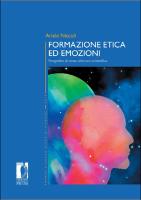Formazione etica ed emozioni
Prospettive di virtue ethics neo-aristotelica
| dc.contributor.author | NICCOLI, ARIELE | |
| dc.date.accessioned | 2022-05-31T10:35:35Z | |
| dc.date.available | 2022-05-31T10:35:35Z | |
| dc.date.issued | 2020 | |
| dc.identifier | ONIX_20220531_9788855181174_903 | |
| dc.identifier | OCN: 1229810266 | |
| dc.identifier.issn | 2705-0297 | |
| dc.identifier.uri | https://library.oapen.org/handle/20.500.12657/55619 | |
| dc.language | Italian | |
| dc.relation.ispartofseries | Premio Ricerca «Città di Firenze» | |
| dc.subject.other | emotions | |
| dc.subject.other | virtue ethics | |
| dc.subject.other | moral education | |
| dc.subject.other | Aristotle | |
| dc.title | Formazione etica ed emozioni | |
| dc.title.alternative | Prospettive di virtue ethics neo-aristotelica | |
| dc.type | book | |
| oapen.abstract.otherlanguage | Affectivity – especially the emotions – are proved to be a key-point of ethical formation. This book aims at clarifying which thesis the neo-aristotelian Virtue Ethics hold about emotion education, by integrating philosophy of education, philosophy of emotions and moral epistemology. Virtue Ethics, compared to deontology and utilitarianism-consequentialism, offers the more appropriate framework to conceive the relations between education, emotions and ethics. The volume discusses cognitive-evaluative theories of emotions and address the anti-rationalist challenge, based on empirical evidence about how emotions impact on moral judgments. Anti-rationalism, it is argued, is incompatible with the purpose of shaping the emotions looking at our best moral reasons. Then, two Aristotelian educational theses are put forward: all the emotional dispositions – both ‘positive’ and ‘negative’ – should be cultivated, and all the emotional dispositions admit an appropriate moral form. | |
| oapen.identifier.doi | 10.36253/978-88-5518-117-4 | |
| oapen.relation.isPublishedBy | bf65d21a-78e5-4ba2-983a-dbfa90962870 | |
| oapen.relation.isbn | 9788855181174 | |
| oapen.relation.isbn | 9788855181167 | |
| oapen.relation.isbn | 9788855181181 | |
| oapen.series.number | 71 | |
| oapen.pages | 150 | |
| oapen.place.publication | Florence |

